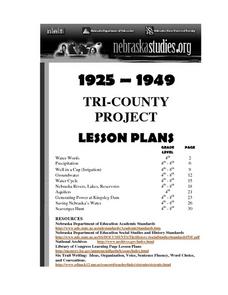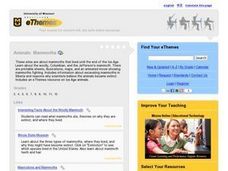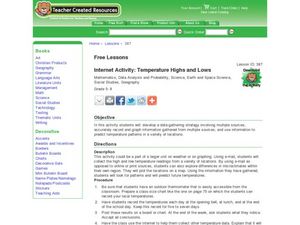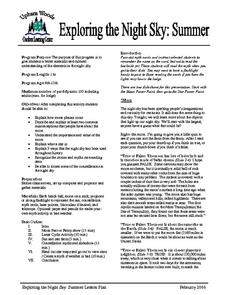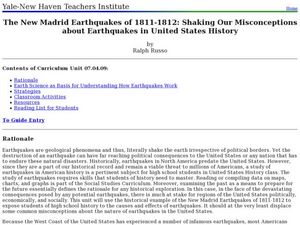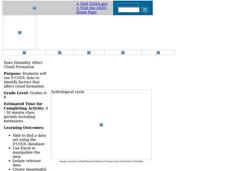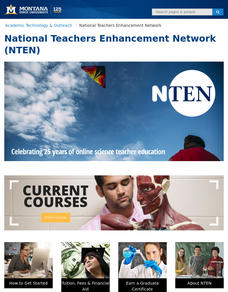Curated OER
Tri-County Project: Precipitation
Students examine and research the annual rainfall in Nebraska. They create a map of the annual rainfall in Nebraska and use the map to develop explanations of settlement.
Curated OER
Meteor Showers!
Young scholars read a story called Orionid Meteors to Shower Earth and answer vocabulary and comprehension questions about it. In this meteor shower lesson plan, students respond to literature by answering questions, view Sky Maps...
Curated OER
Visiting the Arctic Circle
Students familiarize themselves with the Arctic Circle by locating it on a globe and wall map. They discuss they climate in the North Pole and the reasons for its low temperatures. They compare and contrast the climates of the Arctic...
Curated OER
Animals: Mammoths
Students examine websites about mammoths that lived until the end of the Ice Age. They explore the woolly, Columbian, and the Jefferson's mammoth. There are printable sheets, illustrations, maps, and an animated movie showing mammoths...
Curated OER
Temperature High and Lows
Young scholars gather high and low temperature readings through email. In this temperature graphing activity, students use a spreadsheet to input data for a graph. young scholars interpret the graphs to compare and contrast the data from...
Curated OER
Earthquakes
Sixth graders explain that earthquakes are sudden motions along breaks in the crust called faults. They list the major geologic events including earthquakes, volcanic eruptions and mountain building, which are the result of crustal plate...
Curated OER
Using Vegetation, Precipitation, and Surface Temperature to Study Climate Zones
Students begin their examination of the climate zones found around the world. Using a software program, they identify the relationship between the vegetation, climate and temperatures of the different zones. They also plot coordinates...
Curated OER
Exploring the Night Sky: Summer
Young scholars explain how moon phases occur. They describe and explain at least two common misconceptions that people have about the moon. Students explain what a star is. They explain 3 ways that the night sky has been used throughout...
Curated OER
Harvest the Wind
Wind is a natural resource available around the world. Help your pupils appreciate the power and importance of wind by researching wind farms, making pinwheels, and designing windmills.
Curated OER
The New Madrid Earthquakes of 1811-1812: Shaking Our Misconceptions about Earthquakes in United States History
Students Examine how earthquakes work and what plate tectonics and fault lines are. In this earthquake lesson plan students complete an earthquake scavenger hunt.
Curated OER
Trouble in the Troposphere
Learners Use data sets from MY NASA DATA to produce graphs comparing monthly and yearly ozone averages of several U.S. cities. They analyze and evaluate the data and predict trends based on the data. In addition, they discuss and...
Curated OER
Does Humidity Affect Cloud Formation?
Young scholars use NASA's S'COOL database to identify factors that affect cloud formation.
Curated OER
Reef Attack
Students identify the locations of coral reefs. In this oceanography lesson, students use the Coral Reefs website to locate the coral reefs on a world map and discuss ways to help protect the coral reefs.
Curated OER
Panther Scavenger Hunt
Students examine the Florida Panthers through a Web-quest. In this web-based lesson plan, students find clues that will help them to identify the habitat of the Florida Panther and the history of human activity which threatens these wild...
Curated OER
What is Climate?
Students explore the differences between climate and weather. In this introductory lesson of a climate unit, students discuss the vocabulary and concepts associated with weather and climate. They build their information base for the...
Curated OER
Making a Karst Dictionary
Students practice using the correct vocabulary in geology and hydrology. They use the Internet to research topics and practice their researching skills.
Curated OER
Jeannette
Pupils develop hypothesis about what might happen when salt water is frozen. In groups, they freeze ice samples with different salt concentrations. They use the internet to research the situation of the Jeannette to discover their answer.
Curated OER
Sea Surface Temperature Trends of the Gulf Stream
Students explore the importance of the Gulf Stream. Using a NASA satellite images, they examine the sea surface temperature. Students collect the temperature at various locations and times. Using spreadsheet technology, they graph the...
Curated OER
Sea Surface Temperature Trends of the Gulf Stream
Students use authentic satellite data to produce plots and graphs of sea surface temperature as they explore the seasonal changes of the Gulf Stream.
Curated OER
Cool, Clear Water - Or Is It?
Learners use a problem solving method to offer a solution to one of the water quality problems within the Kansas Lower Republican River Basin. Groups research a problem area, then produce a skit, poem, song or story to illustrate the...
Curated OER
Do Human Practices Affect Water Quality?
Students determine if human practices have any noticeable effects on the quality of stream life as measured by the presence of certain macroinvertebrates. They collect, preserve and identify macroinvertibrate samples and quantify the data.
Curated OER
Would You Drink This?
Students examine how they affect water quality of those who live downstream after identifying rivers and river basins in Kansas.
Curated OER
Aruba Cloud Cover Measured by Satellite
Students analyze cloud cover over Aruba. They compose and submit written conclusions which include data, analysis, errors in data collection, and references.
Curated OER
My Own Private Idaho; Using Social Studies to Explore Idaho
Young scholars engage in several activities to explore Idaho and Social Studies themes. Using an variety of media, students become familiar with Idaho's geography and geology.


